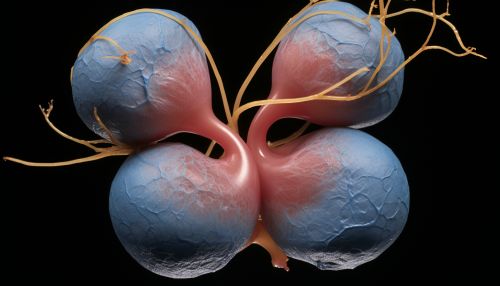Addison's disease
Overview
Addison's disease, also known as primary adrenal insufficiency or hypoadrenalism, is a rare disorder of the adrenal glands. The adrenal glands are two small glands that sit on top of the kidneys and produce vital hormones. These hormones include cortisol, which helps the body respond to stress, and aldosterone, which balances the levels of sodium and potassium in the body. In Addison's disease, the adrenal glands do not produce enough of these hormones.


Causes
Addison's disease occurs when the adrenal glands are damaged and cannot produce enough cortisol or aldosterone. This damage can be caused by a variety of factors, including autoimmune diseases, infections, and certain medications. The most common cause of Addison's disease is an autoimmune response, where the body's immune system mistakenly attacks its own tissues. In the case of Addison's disease, the immune system attacks the adrenal glands.
Symptoms
The symptoms of Addison's disease can be vague and non-specific, making it difficult to diagnose. They often develop slowly and may not be noticed until a stressful event, such as an illness or accident, causes them to worsen. Symptoms can include fatigue, muscle weakness, low blood pressure, weight loss, and skin changes such as darkening of the skin. People with Addison's disease may also crave salty foods due to the loss of sodium and fluid from the body.
Diagnosis
Diagnosis of Addison's disease can be challenging due to the non-specific nature of the symptoms. However, certain tests can help to confirm a diagnosis. These include blood tests to measure the levels of cortisol and aldosterone in the body, and an ACTH stimulation test, which measures how well the adrenal glands respond to a hormone called adrenocorticotropic hormone (ACTH). Imaging tests, such as a CT scan or MRI, may also be used to look for abnormalities in the adrenal glands.
Treatment
Addison's disease is a lifelong condition that can be managed with medication. People with Addison's disease need to take hormone replacement therapy to replace the cortisol and aldosterone that their bodies cannot produce. This usually involves taking a corticosteroid medication such as hydrocortisone or prednisone, and a medication to replace aldosterone, such as fludrocortisone. People with Addison's disease also need to manage their condition during times of stress, such as illness or surgery, when the body's need for cortisol increases.
Prognosis
With proper treatment, people with Addison's disease can lead normal, healthy lives. However, it is important to manage the condition carefully and to seek medical attention for any signs of an adrenal crisis, which is a life-threatening emergency that can occur if the levels of cortisol in the body drop too low. Symptoms of an adrenal crisis include severe abdominal pain, low blood pressure, confusion, and loss of consciousness.
Epidemiology
Addison's disease is a rare condition, affecting approximately 1 in 100,000 people. It can occur at any age, but is most commonly diagnosed in people between the ages of 30 and 50. It is also more common in women than in men.
